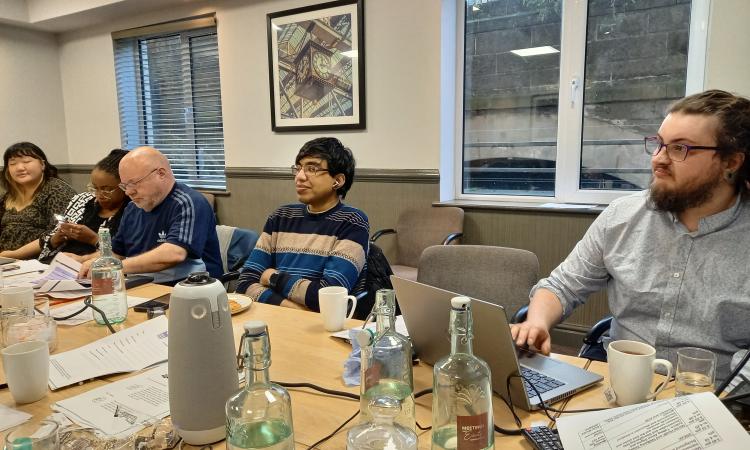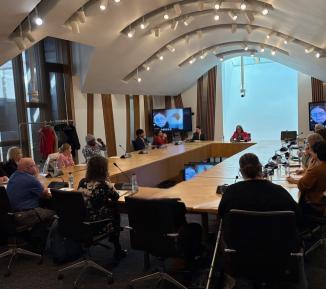
The Diverse Experiences Advisory Panel (DEAP) brings together people from different communities and backgrounds with varied lived experiences and perspectives. DEAP members draw on their personal experiences and perspectives to inform government policy to support better mental health and wellbeing for people and communities across Scotland.
Now in its third year, DEAP is a partnership between the Mental Health Foundation and the Health and Social Care Alliance Scotland (the ALLIANCE) and is funded by the Scottish Government.
Who are DEAP?
DEAP members come from a wide range of backgrounds, including geographies and ages, racialised groups and ethnic communities and different sexualities and genders. Among us, we have wide-ranging life experiences. These include, but aren’t limited to, experiences of long-term health conditions, disability, neurodiversity, care experience, homelessness, unemployment, poverty, immigration and asylum seeking, discrimination, abuse, loneliness and isolation, substance use, bereavement, trauma, unpaid caring and/or experiences of mental health problems.
None of us is defined by a single experience or identity; we are each unique, complex individuals with many experiences that shape our lives. We advise on policy from our lived experiences and perspectives rather than from a professional or academic perspective.
Why do diverse experiences and perspectives matter for mental health?
We all have mental health. Many things shape our experience of mental health. Experiences of inequality, discrimination and/or exclusion can increase the risk of poor mental health and create barriers to well-being.
Our work considers the many factors that shape mental health and well-being and how these interact. These factors aren’t just about physical and mental health; they are not limited to health and social care services.
They also include:
- Our social circumstances. Do we have a support network? Do we feel able to be ourselves with our family and friends, in our workplace and in our community? Do we experience stigma or discrimination? Can we make decisions about our own lives?
- Our economic circumstances. Do we have safe, warm and comfortable housing? Do we struggle to pay for essentials? Are we paid a fair wage? Are we unemployed or in insecure work? Do any benefits we receive support us in living a comfortable and healthy life?
- Our environment. Do we have access to green spaces? Are we able to get around our community? Do we have space to go outside, exercise, or meet our friends? Are we excluded from activities and services because buildings, transport or other facilities are not accessible to us?
- Our life experiences. How do our life experiences affect our mental health and well-being, both good and bad? What do experiences like having a long-term health condition, facing discrimination, experiencing poverty or homelessness or being an unpaid carer mean for our mental health and well-being?
What are we working on?
We are sharing our views to inform the delivery of the Scottish Government’s Mental Health and Well-being Strategy. Two of our members sit on the Leadership Board for the strategy and ensure the voices of DEAP members lived experience is brought to the table. In March 2025 we met with MSP Maree Todd who is the Minister for Social Care, Mental Wellbeing and Sport to ask questions and share our experiences.
We are also working to ensure the mental health impacts of a variety of policy areas consider the impact on mental health and wellbeing as a result of inequalities and will keep you posted on our progress via this webpage.
What's it like being on the panel?
DEAP member Carola has written a blog about her first year as a member of the panel.
If an individual or organisation would like to discuss a project, event or piece of policy that may be of interest to DEAP, please email Sabre Jones.
Email Sabre
Related content
In at the DEAP End

Voices of Experience (VOX)

Mental Health and Wellbeing Strategy for Scotland 2022
